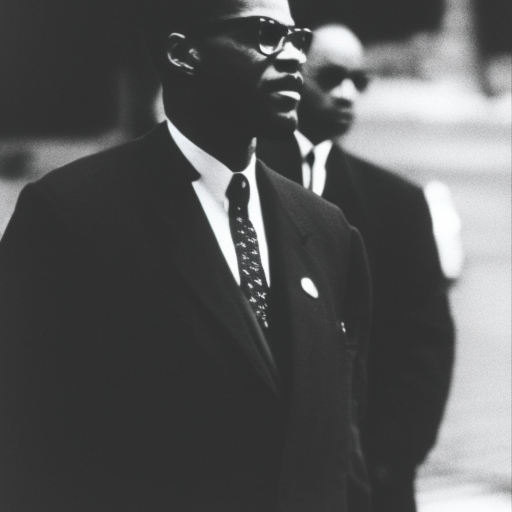Summary:
Malcolm X, born Malcolm Little, was an influential African American civil rights leader and activist. He rose to prominence in the 1960s as a key figure in the Nation of Islam, advocating for black empowerment, self-defense, and the separation of black and white Americans. However, his views evolved after leaving the Nation of Islam, and he became a prominent advocate for racial equality and unity before his assassination in 1965.
Early Life and Conversion to Islam:
Malcolm X was born on May 19, 1925, in Omaha, Nebraska. His father, a Baptist preacher and supporter of Marcus Garvey’s Back-to-Africa movement, was murdered when Malcolm was just six years old. After his father’s death, his family faced discrimination and violence, eventually leading to his mother’s institutionalization and his placement in foster care.
In his youth, Malcolm engaged in criminal activities and was imprisoned in 1946. While in prison, he discovered the teachings of Elijah Muhammad and the Nation of Islam, which emphasized black self-reliance, separatism, and the rejection of white society. Malcolm converted to Islam and changed his last name to “X” to symbolize his lost African heritage.
Rise in the Nation of Islam:
After his release from prison in 1952, Malcolm X became a prominent spokesperson for the Nation of Islam. He quickly rose through the ranks and became the organization’s most influential minister, attracting thousands of followers with his fiery speeches and uncompromising stance against racial injustice. Malcolm X advocated for black economic independence, self-defense, and the establishment of a separate black state.
During this time, Malcolm X’s controversial statements and confrontational approach drew both admiration and criticism. He famously declared, “We didn’t land on Plymouth Rock – Plymouth Rock landed on us,” highlighting the historical and ongoing oppression faced by African Americans.
Break with the Nation of Islam:
In 1964, Malcolm X’s relationship with the Nation of Islam deteriorated due to ideological differences and personal conflicts. He began to question Elijah Muhammad’s leadership and the Nation’s separatist ideology. After a pilgrimage to Mecca, where he witnessed Muslims of all races praying together, Malcolm X’s views on race and religion underwent a profound transformation.
Upon his return to the United States, Malcolm X founded the Organization of Afro-American Unity, which sought to unite all African Americans in the struggle for civil rights. He emphasized the importance of racial harmony and cooperation, advocating for a broader human rights movement that transcended racial boundaries.
Assassination and Legacy:
On February 21, 1965, Malcolm X was assassinated while delivering a speech in New York City. His death shocked the nation and left a void in the civil rights movement. Malcolm X’s legacy continues to inspire and influence activists fighting for racial equality and social justice.
Malcolm X’s life and teachings have had a lasting impact on the struggle for civil rights in the United States. His emphasis on self-determination, black pride, and the fight against systemic racism resonates with many to this day. While his views evolved over time, Malcolm X’s unwavering commitment to the empowerment and liberation of African Americans remains a powerful symbol of resistance and resilience.












